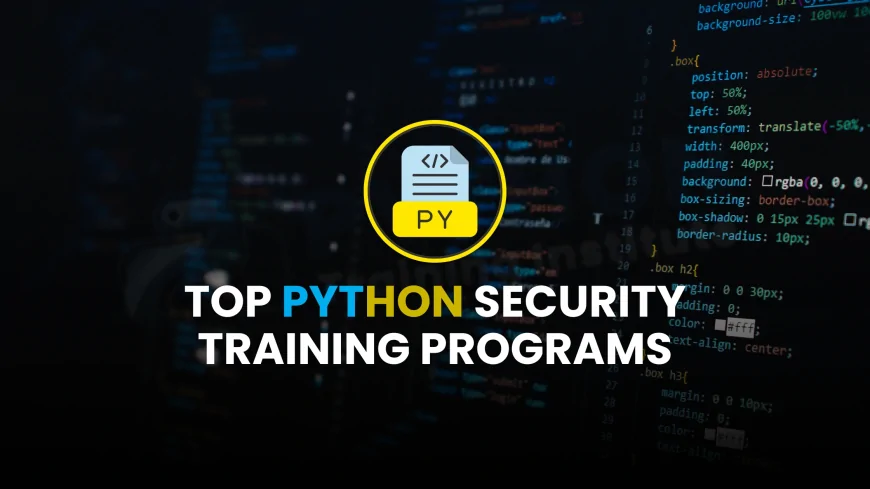Python Security Programming Courses in Pune | Top Institutes Offering Python Security Training in Pune
Enroll in top Python Security Programming Courses in Pune. Learn secure coding, API protection, ethical hacking, and build real-world cybersecurity tools using Python. Job-ready curriculum and live projects included.

Table of Contents
- Introduction
- Why Security-Focused Python Training?
- Core Security Skills Covered
- Top Institutes & Courses in Pune
- Sample Security Projects
- Course Formats & Duration
- Career Paths & Outcomes
- Fees & ROI Analysis
- How to Choose the Right Program
- FAQs
- Conclusion
Introduction
Security is an essential aspect of modern software development, and learning **Python security programming** equips developers to build robust, secure applications. Pune offers a growing selection of specialized courses focusing on secure coding, vulnerability assessment, penetration testing, API safety, and ethical hacking using Python. These programs help professionals and students learn to anticipate and mitigate real-world threats.
Why Security-Focused Python Training?
- Python's popularity: With widespread use in web frameworks, APIs, and automation, security-focused Python knowledge is in demand.
- Defensive mindset: Secure coding avoids exploit risks in production systems.
- Ethical hacking skills: Pen testers use Python for automating tasks in vulnerability assessment.
- Industry demand: Pune's growing cybersecurity sector (like Crowdstrike, Quick-Heal) values Python security expertise :contentReference[oaicite:1]{index=1}.
Core Security Skills Covered
| Skill Area | Topics Covered |
|---|---|
| Secure Coding | Input validation, sanitization, error handling, OWASP Top 10 |
| Pen Testing | Scanning tools (Nmap), Python exploitation scripts, SQLi, XSS, CSRF |
| API Security | OAuth, API injection, JWT validation, Fuzzing |
| Automation Tools | Selenium, Scapy, Requests for network/security testing |
| Crypto & Steganography | Hashing, encryption (AES, RSA), Python cryptography libraries |
| Cloud Security | Scripting for AWS, GCP, CI/CD security checks |
Top Institutes & Courses in Pune
Webasha Technologies – Includes security-centric Python programming modules as part of their broader training program.
Key Highlights:
- Emphasis on secure coding practices using Python.
-
Modules covering vulnerability detection, automation for cybersecurity tasks, and ethical hacking fundamentals.
-
Real-time workshops and interactive lab sessions.
Placement Support:
-
Strong placement cell with mock interview training.
-
Resume-building support and company connections in cybersecurity domains.
Special Features:
- Weekend + evening batches.
-
Guest lectures from cybersecurity professionals.
-
Affordable pricing with EMI options.
Sample Security Project Examples
- Vulnerability Scanner: Python script uses Nmap to detect open ports and scans for common vulnerabilities.
- Secure API Endpoint: Flask app with JWT authentication, rate limiting, and input sanitization.
- Web Scraping With Care: Scraping tool with CAPTCHAs, randomized headers, and sandbox integration.
- Network Packet Sniffer: Scapy script to monitor suspicious traffic and log anomalies.
- Encrypted File Transfer: Tool that encrypts files using AES and sends them securely over the network.
Course Formats & Duration
- Part-time / Weekend: 6–10 weekends covering modules and labs.
- Full-time Bootcamps: 8–12 week immersive courses including project work.
- Online / Hybrid: Interactive live sessions, recordings, and hands-on assignments.
- Self-paced + Mentorship: Pre-recorded modules with periodic live review sessions.
Career Paths & Outcomes
- Security Engineer: Develop secure applications and integrate security tools.
- Penetration Tester / Ethical Hacker: Use scripts to identify weaknesses and provide reports.
- DevSecOps Engineer: Automate security checks in CI/CD pipelines.
- Network Security Analyst: Monitor and script on network activity to detect threats.
- Freelance Security Consultant: Offer vulnerability audits or secure coding services.
- Entry-level salaries for Pune security roles range from ₹4–8 LPA, rising with niche Python security skills :contentReference[oaicite:9]{index=9}.
Fees & ROI Analysis
| Institute | Duration | Fee (₹) | ROI Highlights | |
|---|---|---|---|---|
| Webasha Technologies | 8–12 weeks | ₹18,000 – ₹25,000 | Security modules, hands-on labs, certification, placement support | Placement assistance with entry-level cybersecurity and automation roles (₹3.5–6 LPA) |
Most learners report recouping fees within months, through job offers or freelance consulting engagements.
How to Choose the Right Program
- Project focus: Ensure courses include security-specific Python projects.
- Batch size: Smaller cohorts (<20) offer better guidance and lab access.
- Hands-on labs: Live coding security scenarios during class matters more than theory.
- Placement assistance: Templates, mock interviews, and job connections strengthen ROI.
- Instructor credentials: Prefer trainers with real experience—Cyber Success highlights trainers working professionals :contentReference[oaicite:10]{index=10}.
FAQs
1. Why choose a Python-based security course?
Python is widely used for automation and securing tools, making it perfect for security-related development.
2. Do I need prior security experience?
No—courses are designed to start from basics with Python fundamentals and build up to security topics.
3. Will I learn ethical hacking?
Yes—many programs include pen-testing fundamentals, scripting exploits, and reporting vulnerability findings.
4. Are certificates included?
Most institutes provide completion certificates; some are recognized by industry partners or Govt bodies (like Henry Harvin).
5. What tools will I use?
Expect to use Nmap, Scapy, Requests, Selenium, Flask, JWT libraries, and Python cryptography tools.
6. Will there be real projects?
Yes—students build practical scripts like vulnerability scanners, secure APIs, and packet sniffers.
7. Can I pursue this part-time?
Absolutely—many courses are weekend or evening formats ideal for working professionals.
8. Is there placement support?
Institutes like Cyber Success and Besant Technologies offer placement guidance and mock interviews.
9. What job roles can I apply for after completing?
Security Engineer, Penetration Tester, DevSecOps Engineer, Security Analyst, or Freelance Security Consultant.
10. Do courses include API security?
Yes—they teach securing APIs, handling JWT tokens, implementing access controls, and fuzz testing.
11. Are cloud security topics covered?
Some advanced courses include script-based tooling for AWS/GCP security checks.
12. How long does it take to complete?
Programs range from 30 hours (short bootcamps) to 3–4 months (comprehensive courses).
13. What are typical fees?
Fees range between ₹15k–₹40k depending on depth and support features.
14. Are live classes important?
Yes—security programming relies on hands-on labs and real-time debugging scenarios.
15. Do I need a computer? Must it run Linux?
A laptop with administrative access is enough; Linux tools may require virtual machine setups.
16. Can I freelance after completing the course?
Yes—security scripting services or pentest reports can be offered to clients using Python expertise.
17. How are batches formed?
Batches are typically capped at 15–20 students to enhance learning through interaction and lab access.
18. Is there a demo or trial class?
Yes—all listed institutes offer demo sessions; always attend to evaluate fit before enrolling.
19. Will ethical training be provided?
Yes—ethical standards and legal guidelines for script testing are included in many programs.
20. How do I continue learning after the course?
Join security meetup groups, contribute to open-source pentest tools, earn certifications like CEH, OSCP, or pursue bug bounty challenges to build expertise.
Conclusion
Python security programming is no longer niche—it’s essential in modern software development. Pune offers many targeted courses that focus on secure coding, ethical hacking, and vulnerability detection using Python. Institutes like Cyber Success, Besant Technologies, TechFusion, Ethans, 3RI, and Henry Harvin deliver well-rounded programs with live labs, real projects, and placement support. By choosing a program with practical security projects, industry-aligned mentors, and career services, you can gain in-demand skills and launch a career as a backend security engineer, pen tester, or DevSecOps specialist.
What's Your Reaction?
 Like
0
Like
0
 Dislike
0
Dislike
0
 Love
0
Love
0
 Funny
0
Funny
0
 Angry
0
Angry
0
 Sad
0
Sad
0
 Wow
0
Wow
0
















